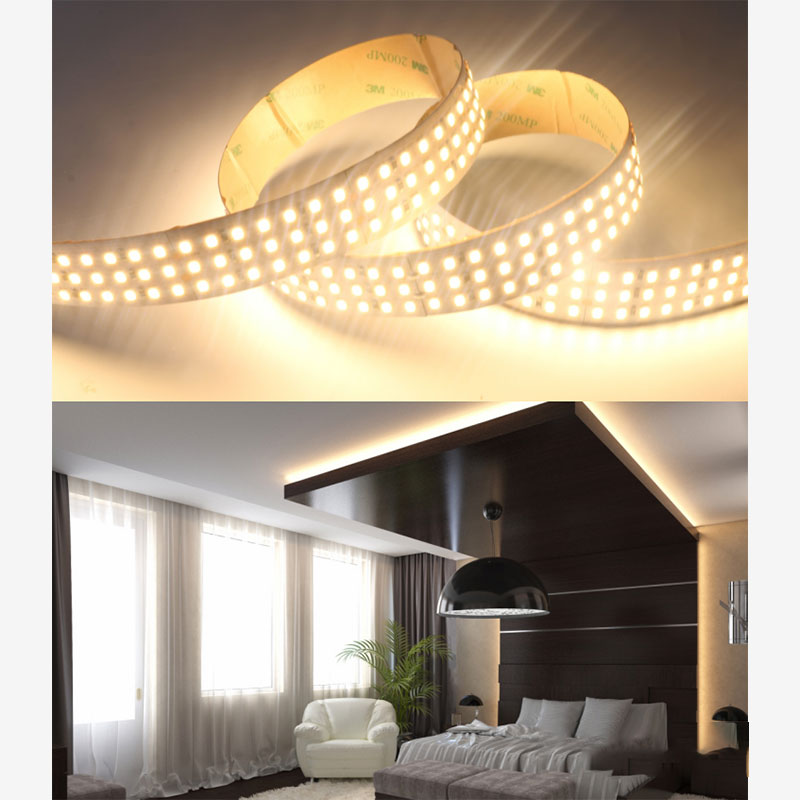Why Choose LED Flexible Strip Lighting for Modern Spaces?
2025-09-05
In today’s fast-paced world, lighting has evolved far beyond its traditional purpose. It is no longer just about illumination; it’s about creating ambiance, highlighting details, saving energy, and enabling smart living. Among the most innovative solutions available today, LED flexible strip lighting has emerged as one of the most versatile and high-demand lighting technologies worldwide. From residential interiors to commercial spaces and architectural designs, LED strips offer unparalleled adaptability, superior performance, and a sleek aesthetic that fits seamlessly into modern lifestyles.
What Makes LED Flexible Strip Lighting the Future of Illumination?
LED flexible strip lights, also called LED tape or ribbon lights, are thin, flexible circuits embedded with small light-emitting diodes (LEDs). Unlike traditional rigid lighting, these strips can be bent, cut, and installed in spaces where conventional fixtures simply cannot fit.
Here are the core reasons why LED flexible strips are shaping the future of modern lighting:
A. Versatility in Application
LED strips can be used in a wide range of settings, from under-cabinet kitchen lighting and living room ambience to large-scale architectural designs and retail showcases. Their slim profile and flexible structure make them ideal for:
-
Interior decoration: Accentuating shelves, ceilings, furniture edges, and walls.
-
Outdoor environments: IP65+ waterproof strips for gardens, patios, and facades.
-
Commercial spaces: Highlighting product displays, signboards, and branding elements.
-
Automotive customization: Creating eye-catching effects for dashboards, car interiors, and headlights.
B. Energy Efficiency and Sustainability
LED technology consumes up to 80% less energy than traditional incandescent or halogen bulbs. By using LED flexible strips, households and businesses can significantly reduce power bills while minimizing environmental impact. Additionally, most LED strips are designed to last up to 50,000 hours, making them a long-term sustainable lighting solution.
C. Seamless Integration with Smart Home Systems
Modern LED strips are compatible with smart home ecosystems, allowing users to control brightness, color, and patterns via apps or voice commands. This integration makes it easy to create personalized lighting experiences, whether for relaxation, productivity, or entertainment.
How to Choose the Right LED Flexible Strip for Your Needs?
When selecting the perfect LED flexible strip, understanding the technical specifications is essential. A professional choice ensures optimal brightness, longevity, and cost-effectiveness.
Key Specifications of LED Flexible Strips
| Parameter | Specification | Why It Matters |
|---|---|---|
| Input Voltage | DC12V / DC24V | Determines power source compatibility and brightness stability. |
| LED Type | SMD2835, SMD3528, SMD5050, SMD5630 | Larger SMD numbers mean brighter and wider light output. |
| Color Options | Warm White, Cool White, RGB, RGBIC | Choose based on ambiance: warm tones for coziness, RGB for dynamic effects. |
| Brightness | 300 – 1800 lumens per meter | Higher lumens equal brighter light output. |
| Waterproof Rating | IP20 / IP65 / IP67 | Select IP65+ for outdoor or humid environments. |
| Power Consumption | 4.8W – 24W per meter | Directly impacts energy usage and transformer requirements. |
| Control Options | Remote, Wi-Fi, Bluetooth, Voice Control | Enables smart customization and scheduling. |
| Lifespan | Up to 50,000 hours | Ensures long-term performance and reduced maintenance. |
When comparing LED strips, focus on matching the specifications to your project’s requirements. For example:
-
A kitchen under-cabinet installation works best with 12V warm white SMD2835 strips.
-
Outdoor decks require 24V IP65 RGB strips to handle weather exposure.
-
For smart home enthusiasts, Wi-Fi or Bluetooth-enabled RGBIC strips allow synchronized lighting effects with other devices.
Why LED Flexible Strip Lights Are Ideal for Professionals and Homeowners
LED flexible strips have become the go-to solution for designers, architects, and homeowners alike. Their aesthetic flexibility, combined with technical superiority, makes them suitable for a wide range of projects.
A. Elevating Residential Spaces
Homeowners are increasingly adopting LED strips to add a modern touch to living areas:
-
Ambient lighting: Installing strips behind TVs, mirrors, or shelves enhances mood and reduces glare.
-
Task lighting: Kitchen counters, study desks, and workbenches benefit from bright, focused illumination.
-
Decorative features: LED strips highlight architectural elements like staircases, coves, and wall niches.
B. Enhancing Commercial and Retail Environments
In retail and hospitality industries, first impressions matter. LED strips are widely used to:
-
Highlight premium products on shelves.
-
Create attractive shopfront displays.
-
Enhance brand recognition with vivid lighting effects.
-
Improve overall ambiance to encourage customer engagement.
C. Advancing Architectural and Outdoor Projects
Architects and landscape designers leverage LED strips to add elegance and drama to modern designs:
-
Facade lighting: Enhance the visual impact of buildings.
-
Pathway illumination: Improve safety and visibility without bulky fixtures.
-
Outdoor landscaping: Create immersive experiences with weatherproof LED strips.
D. Cost Savings and Long-Term Value
Compared to traditional bulbs and tubes, LED flexible strips deliver significant savings:
-
Lower electricity costs: High efficiency reduces ongoing power bills.
-
Reduced maintenance: With lifespans of up to 50,000 hours, replacements are minimal.
-
Eco-friendly technology: Reduced energy consumption translates into a smaller carbon footprint.
FAQs About LED Flexible Strip Lighting
Q1. How do I install LED flexible strip lights?
Answer: Most LED strips come with an adhesive backing for easy installation. Clean the surface thoroughly, peel off the protective layer, and stick the strip in place. For complex layouts, connectors or soldering may be required. Always ensure the correct voltage and compatible power supply to avoid damage.
Q2. Can LED flexible strips be cut to size?
Answer: Yes, LED strips are designed to be cut at marked intervals without affecting functionality. These cut points are usually located every 3 to 6 LEDs. After cutting, you can reconnect sections using soldering or clip-on connectors, ensuring flexibility for custom installations.
Choose Kons Lighting for Premium LED Flexible Strips
Whether you are upgrading your home’s ambiance, designing an innovative commercial display, or working on an architectural masterpiece, LED flexible strip lighting offers unmatched versatility, efficiency, and style. By selecting the right product specifications, you can transform any environment into a beautifully illuminated space.
At Kons Lighting, we specialize in providing high-quality, durable, and customizable LED flexible strip solutions tailored to meet your unique project requirements. Our products combine advanced technology with professional-grade performance, ensuring long-lasting satisfaction.
Ready to transform your space? Contact us today to explore our full range of LED flexible strip lighting solutions and discover how Kons Lighting can bring your vision to life.



